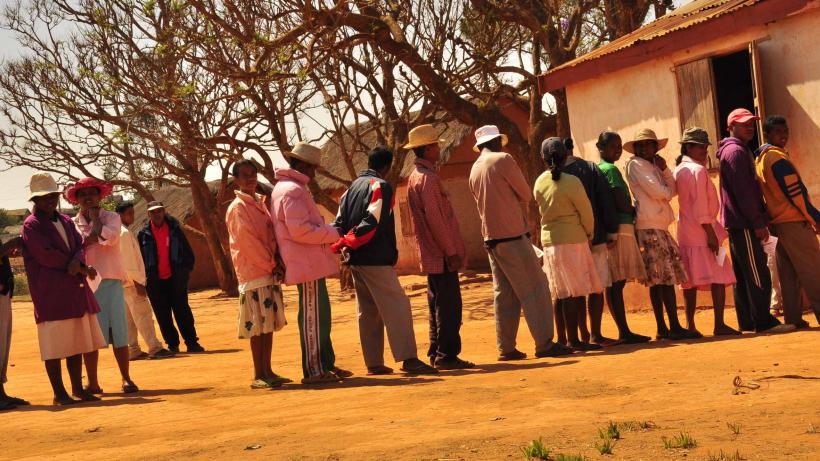
Post-election challenges for Zambia
The two leading candidates in Zambia's presidential election are in a tight race. The result while have a big influence on the country’s future economic direction
The two leading candidates in Zambia's presidential election are in a tight race. The result will have a big influence on the country’s future economic direction
Celebrations of the National Jubilee as Zambia marked 50 years of independence on 24 October 2014, brought a sense of unity across the nation. It was only a few days later that the announcement of President Michael Sata’s death dampened this celebratory mood, and the country immediately went into a period of national mourning. An experience Zambia has gone through before following the death of President Levy Patrick Mwanawasa in 2008. In the event of a death of the Republican President, the constitution states that a presidential by-election should be held within 90 days – and during this period the vice president will act as president. Guy Scott is now the acting president of Zambia.
Nonetheless, the presidential by-elections have brought eleven presidential candidates to contest the 2015 by-election. Despite there being many candidates, the race is effectively between the 2 favourites; Edgar Lungu of the ruling Patriotic Front (PF) and Hakainde Hichilema of the United Party for National Development (UPND).
The key issue
While the question of who will be the next president remains, Zambia’s current economic situation cannot be overlooked. Growth in GDP has averaged above 5 percent for over a decade now but some analysts have come to describe this as a ‘jobless growth’ as it has failed to translate into job creation and poverty levels still remain high. Mining remains the countries major contributor to tax revenue and export earnings, and loss in investment or production could put pressure on the favourable growth that Zambia has been experiencing. With uncertainties in terms of the global demand for copper, there is immense risk that prices could fall to unfavourable levels. There has already been a slowdown in FDI inflows as a result of subdued global demand and weaker commodity prices. The incoming government has to work towards diversifying the economy away from Copper and actively promote the growing non-traditional exports which have shown potential to reduce the burden on metal exports. Import prices have been high following the fluctuation in the exchange rate.
Improving Zambia’s performance
The 2 leading political contenders have so far shown great desire to improve Zambia’s economic performance. In addition to continuing Michael Sata’s legacy of pro-poor growth policies Edgar Lungu (PF) has promised to work towards improving service delivery, reducing the price of consumer goods and encouraging the diversification of crop and economic diversification. He has further pledged to continue with one of Zambia’s most ambitious but also expensive road infrastructure programme throughout the country that Sata started. In addition, he is committed to improving the agriculture sector through timely provision of farming inputs and finding markets for the farming products. Edgar Lungu (PF) also intends to engage the mines in the provision of education facilities to individuals and will prioritise economic empowerment for women and job creation for young people. In an effort to create new jobs and reduce poverty, he will work towards making some towns industrial hubs.
Hakainde Hichilema (UPND) on the other hand wants to run a market economy in which the private sector will be the engine of growth and his government will provide an environment for the private sector to thrive. He hopes to promote industrialization by offering start-up capital and technology transfer to SMEs. To further address the unemployment and job creation problem, robust policies that include public, private partnerships (P.P.P) in all sectors of the economy and support such as guarantee loans schemes to labour intensive companies will be put in place. In addition, his government intends to realign the tax regime to international standards such as mineral royalty, corporate tax and windfall tax; restructure the precious and semi‐precious mining sub‐sector; and provide initial mining support services by providing seed capital to cover initial exploration costs or link them to capital markets. Hakainde Hichilema (UPND) has further pledged to implement free education in primary and secondary schools, and provide remuneration based on qualification, experience and productivity. He will also focus on health and housing, by improving access to quality health care and through lower mortgage rates for house buyers.
Political and economic anxiety
In the face of all the political and economic anxiety, the International Growth Centre in Zambia stands ready to up its policy engagement with whoever will be part of the new government that may come with the change of the head of state. Currently, IGC is working on assessing the Property Taxation and Mining Rights Tax System in Zambia in order to improve Domestic Resource Mobilisation - a core objective of Government. IGC, through its urbanisation programme is also strategically positioned to provide input to Zambia’s first ever Urbanisation policy being led by the Ministry of Local Government and Housing.
Zambia has always experienced peaceful elections, and there is no reason to believe this will not be the case now. As a new president steps into power, the new government should remain committed to working towards economic and social development in the country.

